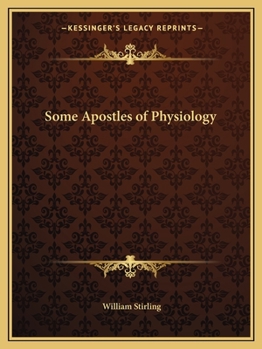Some Apostles of Physiology; Being an Account of Their Lives and Labours, Labours That Have Contributed to the Advancement of the Healing Art as Well as to the Prevention of Disease
Select Format
Select Condition 
Book Overview
Some Apostles of Physiology is a book written by William Stirling, a Scottish physician and physiologist. The book provides a detailed account of the lives and contributions of some of the most prominent figures in the field of physiology, including William Harvey, Johannes M�����ller, Claude Bernard, and Hermann von Helmholtz. Stirling explores the scientific discoveries and theories of these individuals, as well as their personal lives and the historical context in which they lived and worked. The book also includes illustrations and diagrams to help readers understand the complex ideas and concepts discussed. Overall, Some Apostles of Physiology is a comprehensive and engaging exploration of the pioneers of physiology and their impact on the field.1902. An account of the lives and labors of some apostles of physiology, labors that have contributed to the advancement of the healing art as well as to the prevention of disease. The book is copiously and beautifully illustrated throughout with portraits of the fathers of physiology and other miscellaneous illustrations.This scarce antiquarian book is a facsimile reprint of the old original and may contain some imperfections such as library marks and notations. Because we believe this work is culturally important, we have made it available as part of our commitment for protecting, preserving, and promoting the world's literature in affordable, high quality, modern editions, that are true to their original work.
Format:Paperback
Language:English
ISBN:1162585684
ISBN13:9781162585680
Release Date:September 2010
Publisher:Kessinger Publishing
Length:204 Pages
Weight:1.04 lbs.
Dimensions:0.4" x 8.3" x 11.0"
Customer Reviews
5 customer ratings | 5 reviews
There are currently no reviews. Be the first to review this work.




















